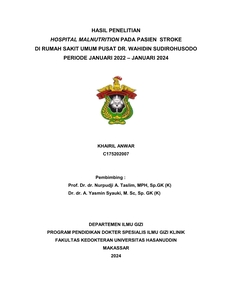ANWAR, KHAIRIL (2024) HOSPITAL MALNUTRITION PADA PASIEN STROKE DI RUMAH SAKIT UMUM PUSAT DR. WAHIDIN SUDIROHUSODO PERIODE JANUARI 2022 – JANUARI 2024 = HOSPITAL MALNUTRITION IN STROKE PATIENTS AT DR. WAHIDIN SUDIROHUSODO CENTRAL GENERAL HOSPITAL JANUARY 2022 – JANUARY 2024 PERIOD. Thesis thesis, UNIVERSITAS HASANUDDIN MAKASSAR.
![[thumbnail of cover]](/47650/1.hassmallThumbnailVersion/C175202007_tesis_14-01-2025%20cover1.jpg)

C175202007_tesis_14-01-2025 cover1.jpg
Download (266kB) | Preview
C175202007_tesis_14-01-2025 bab 1-2.pdf
Download (1MB)
C175202007_tesis_14-01-2025 dp.pdf
Download (243kB)
C175202007_tesis_14-01-2025.pdf
Restricted to Repository staff only until 26 September 2027.
Download (2MB)
Abstract (Abstrak)
Introduction: Hospital malnutrition is a prevalent issue among stroke patients, with significant impacts on immune function and clinical outcomes. Malnutrition is associated with poor outcomes such as increased complications, prolonged recovery, and higher mortality. This study aims to assess the prevalence of malnutrition using the Malnutrition Screening Tool (MST) and its association with clinical outcomes, including length of stay (LOS), inflammatory markers, and mortality. Methods: A retrospective cohort study was conducted, including 230 stroke patients who were admitted between January 2022 and January 2024. Nutritional status was assessed using the MST, with key outcomes including LOS, Total Lymphocyte Count (TLC), Neutrophil-to-Lymphocyte Ratio (NLR), serum albumin, Prognostic Nutritional Index (PNI), and mortality. Statistical analyses were performed using chi-square tests for categorical variables and t-tests or Mann-Whitney U tests for continuous variables, with a p-value of <0.05 considered statistically significant. Result: The study found that 26.5% of patients had an MST score of 2 or higher, indicating a high risk of malnutrition. Patients with high MST scores had significantly lower TLC (p = 0.01), indicating a weakened immune response. No significant differences were observed in LOS (p = 0.63), mortality (p = 0.40), or other inflammatory markers such as NLR, albumin, and PNI between the high-risk and low-risk groups. Conclusion: Malnutrition is common among stroke patients and is associated with impaired immune function, as evidenced by lower TLC in malnourished patients. Although no significant differences were observed in LOS or mortality, the findings underscore the importance of routine nutritional screening and timely intervention to improve patient outcomes.
| Item Type: | Thesis (Thesis) |
|---|---|
| Uncontrolled Keywords: | Malnutrition, Stroke, MST, Immune Function, TLC |
| Subjects: | R Medicine > R Medicine (General) |
| Divisions (Program Studi): | Fakultas Kedokteran > PPDS - Ilmu Gizi Klinik |
| Depositing User: | Unnamed user with username pkl2 |
| Date Deposited: | 21 Jul 2025 02:28 |
| Last Modified: | 21 Jul 2025 02:28 |
| URI: | http://repository.unhas.ac.id:443/id/eprint/47650 |


